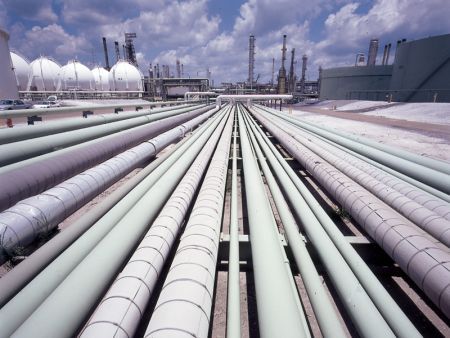
Pipeline companies have come down with shale fever. They’re so eager to grab a stake in the U.S. energy boom that they’re building transmission networks before getting the traditional commitment from drillers that anyone will actually use them.
Instead of negotiating guarantees from drillers that they’ll pay fees or pump a minimum volume of oil and gas through their systems, pipeline companies such as Eagle Rock Energy Partners LP and Oryx Midstream Services LLC say they are signing agreements based on the acreage of the fields the producers plan to drill. Producers are getting away with it because there’s more competition to ship as domestic crude-oil output has risen to its highest level since 1988.
Video: Pipeline Companies Come Down With Shale Fever
“There’s an assumption, and I’m not sure it’s exactly valid, that acreage will equal volume,” said Allen Gilmer, chairman and chief executive officer of Austin, Texas-based Drillinginfo Inc., which tracks wells. “I’d sure as heck want to have a volume consideration.”
Six years into the shale-driven energy boom, pipeline companies, many of them backed by private-equity funds, are taking on the risk usually shouldered only by drillers -- if the wells come in, they can reap a bonanza. If not, they face losses. Infrastructure firms have historically been less vulnerable to energy-price changes and unpredictable wells.
Shared Risk
Consider Apache Corp. (APA:US)’s holdings in Oklahoma and the Texas panhandle, where the Houston-based company pumped more than 91,000 barrels of oil and gas a day last year. Apache said in its annual report that the region has proved reserves of 304 million barrels of oil, gas and liquid fuels. In contracts with companies such as Eagle Rock to build pipelines to those wells, Apache didn’t promise to deliver a single barrel.
Story: Junk Bonds Fuel the Shale Boom
That means Apache won’t get stuck drilling unprofitable wells just to fill pipeline capacity it already paid for, said Mark Bright, vice president of Apache’s North America oil and gas marketing.
“We like to share the risk,” Bright said. “We’re going to drill the most economic well, we’re going to put out capital where it makes sense, and it’s not going to be because we have capacity to fill.”
Apache shares have risen 14 percent to $86.42 in the past year as of 4 p.m. in New York. Houston-based Eagle Rock has fallen 49 percent to $4.46.
Video: Flaring Wastes Gas as North Dakota Lacks Pipelines
Jeff Wood, Eagle Rock’s chief financial officer, declined to comment.
‘More Upside’
Potentially profiting from everything pumped from a plot of land outweighs the security of a guaranteed minimum, Brett Wiggs, Oryx’s chief executive officer, said by phone April 29. The Midland, Texas-based company said last month it would begin building as many as 140 miles of oil and gas pipelines for three companies that dedicated output from 340,000 acres in New Mexico.
“There’s more risk, but potentially more upside,” Wiggs said.
Blog: Those Scary Reports About Soaring Gas Prices? They're Wrong
Pipeline companies can take the risk because they study what’s in the ground, not simply the financial health of the producer, according to Frost Cochran, a managing director of Post Oak Energy Capital, a Houston-based private-equity firm with a stake in Oryx.
Traditional wells bore vertically. Shale oil and gas are extracted by drilling horizontally across rock formations and blasting the rock with water to release trapped fuel.
Steeper Declines
Shale well production declines 60 to 70 percent in the first year, compared with conventional wells that take two years to fall 55 percent before flattening out, according to Drillinginfo.
Story: General Mills Explores Peas in Search of the Next Superfood
That makes it expensive for producers to keep output steady, much less increase it. Shale wells can cost as much as $13 million, according to Goodrich Petroleum Corp. (GDP:US) in Houston. Conventional wells cost as little as $1.5 million, according to Hart Energy LLC, a Houston-based research company.
Those costs are keeping producers focused on drilling, giving them less money to invest in pipelines, storage and processing plants, said Bryan Loocke, a Houston-based partner at law firm Bracewell & Giuliani LLP who focuses on energy finance.
“Producers are more tightly focused on the drill bit,” he said. Pipeline companies “have more cash to spend.”
The pipeline industry is also becoming more competitive because of the growth of master limited partnerships, tax-exempt infrastructure companies known as MLPs, Loocke said. The number of MLPs has almost doubled to 114 in the past four years, data compiled by Bloomberg show.
Amid the surge of interest, some projects are receiving as many as 10 bids to build pipelines and companies are accepting more risk in order to win, according to Nathen McEown, a Dallas-based senior manager at Whitley Penn LLP, a consulting company specializing in energy.
“There’s a lot of capital looking to get deployed,” McEown said.
Source: Bloomberg
We use cookies to improve your experience. By continuing to use our site, you accept our Cookies, Privacy Policy,Terms and Conditions. Close X